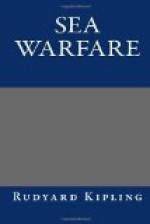A BRAWL AT A PIER
Now we will take E14 on various work, either alone or as flagship of a squadron composed of herself and Lieutenant-Commander Nasmith’s boat, E11. Hers was a busy midsummer, and she came to be intimate with all sort of craft—such as the two-funnelled gunboat off Sar Kioi, who “fired at us, and missed as usual”; hospital ships going back and forth unmolested to Constantinople; “the gunboat which fired at me on Sunday,” and other old friends, afloat and ashore.
When the crew of the Turkish brigantine full of stores got into their boats by request, and then “all stood up and cursed us,” E14 did not lose her temper, even though it was too rough to lie alongside the abandoned ship. She told Acting Lieutenant R.W. Lawrence, of the Royal Naval Reserve, to swim off to her, which he did, and after a “cursory search”—Who can be expected to Sherlock Holmes for hours with nothing on?—set fire to her “with the aid of her own matches and paraffin oil.”
Then E14 had a brawl with a steamer with a yellow funnel, blue top and black band, lying at a pier among dhows. The shore took a hand in the game with small guns and rifles, and, as E14 manoeuvred about the roadstead “as requisite” there was a sudden unaccountable explosion which strained her very badly. “I think,” she muses, “I must have caught the moorings of a mine with my tail as I was turning, and exploded it. It is possible that it might have been a big shell bursting over us, but I think this unlikely, as we were 30 feet at the time.” She is always a philosophical boat, anxious to arrive at the reason of facts, and when the game is against her she admits it freely.
There was nondescript craft of a few hundred tons, who “at a distance did not look very warlike,” but when chased suddenly played a couple of six-pounders and “got off two dozen rounds at us before we were under. Some of them were only about 20 yards off.” And when a wily steamer, after sidling along the shore, lay up in front of a town she became “indistinguishable from the houses,” and so was safe because we do not loewestrafe open towns.
Sailing dhows full of grain had to be destroyed. At one rendezvous, while waiting for E11, E14 dealt with three such cases and then “towed the crews inshore and gave them biscuits, beef, and rum and water, as they were rather wet.” Passenger steamers were allowed to proceed, because they were “full of people of both sexes,” which is an unkultured way of doing business.
Here is another instance of our insular type of mind. An empty dhow is passed which E14 was going to leave alone, but it occurs to her that the boat looks “rather deserted,” and she fancies she sees two heads in the water. So she goes back half a mile, picks up a couple of badly exhausted men, frightened out of their wits, gives them food and drink, and puts them aboard their property. Crews that jump overboard




